November 2020 witnessed sweeping changes to the prevailing strategy for booking domestic flights within Canada on points… and they weren’t exactly positive changes.
First off, the launch of WestJet’s new Member Exclusive fares removed the ability to lock in a one-way flight across Canada for a fixed price of 125 WestJet Dollars, instead introducing a model of dynamic discounts upon the base fare.
Then, a few days later, the new Aeroplan program brought with it a dynamic pricing model on Air Canada flights; while some flights would now be bookable at a cheaper price than before, others would become more expensive, and the overall lack of predictability in the pricing makes it harder to plan your upcoming redemptions compared to before.
For those of you who might be lamenting the fact that domestic flights may now cost an arm and a leg, don’t panic just yet: there may be some mild reprieve if we look at foreign frequent flyer programs from outside Canada and redeeming those points for domestic flights instead.
Redeeming Delta SkyMiles on WestJet
The most exciting possibility is the fact that even though WestJet’s new Member Exclusive fares no longer offer fixed-price awards within Canada, the spirit of the old Member Exclusive fares lives on through Delta SkyMiles.
Delta and WestJet are partners, and one airline’s points currency can be redeemed for travel on the other. Alas, Delta SkyMiles doesn’t publish an award chart, so the only way to know how many miles are needed for an award is to search on your own.
Nevertheless, when you log into Delta SkyMiles and search for intra-Canada flights, you’ll typically be able to find a total of four seats on most WestJet-operated flights for a fixed price of 12,500 SkyMiles one-way… does that sound familiar?
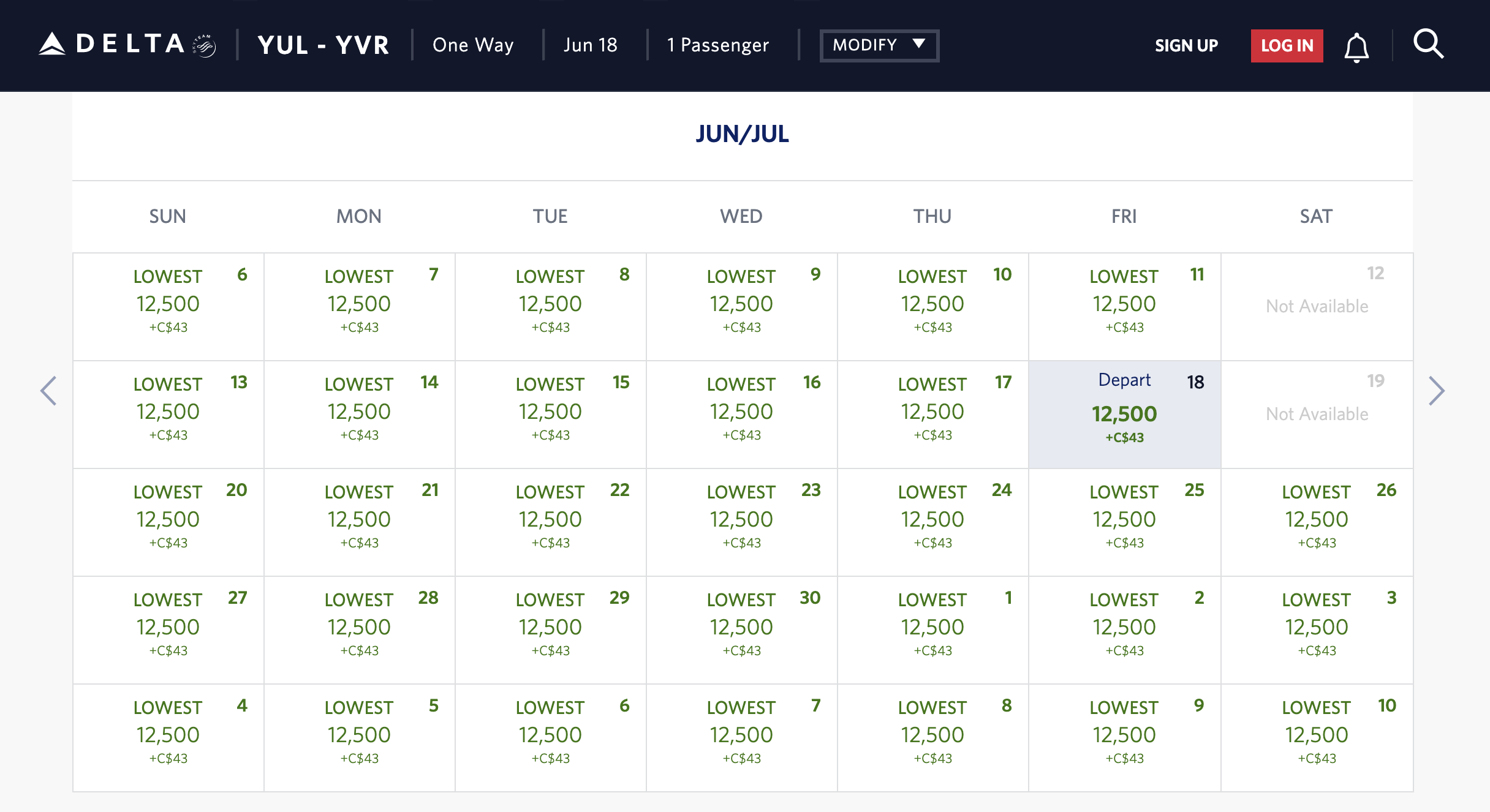
Note that the Delta SkyMiles search engine is most likely to show results when there’s a direct flight available.
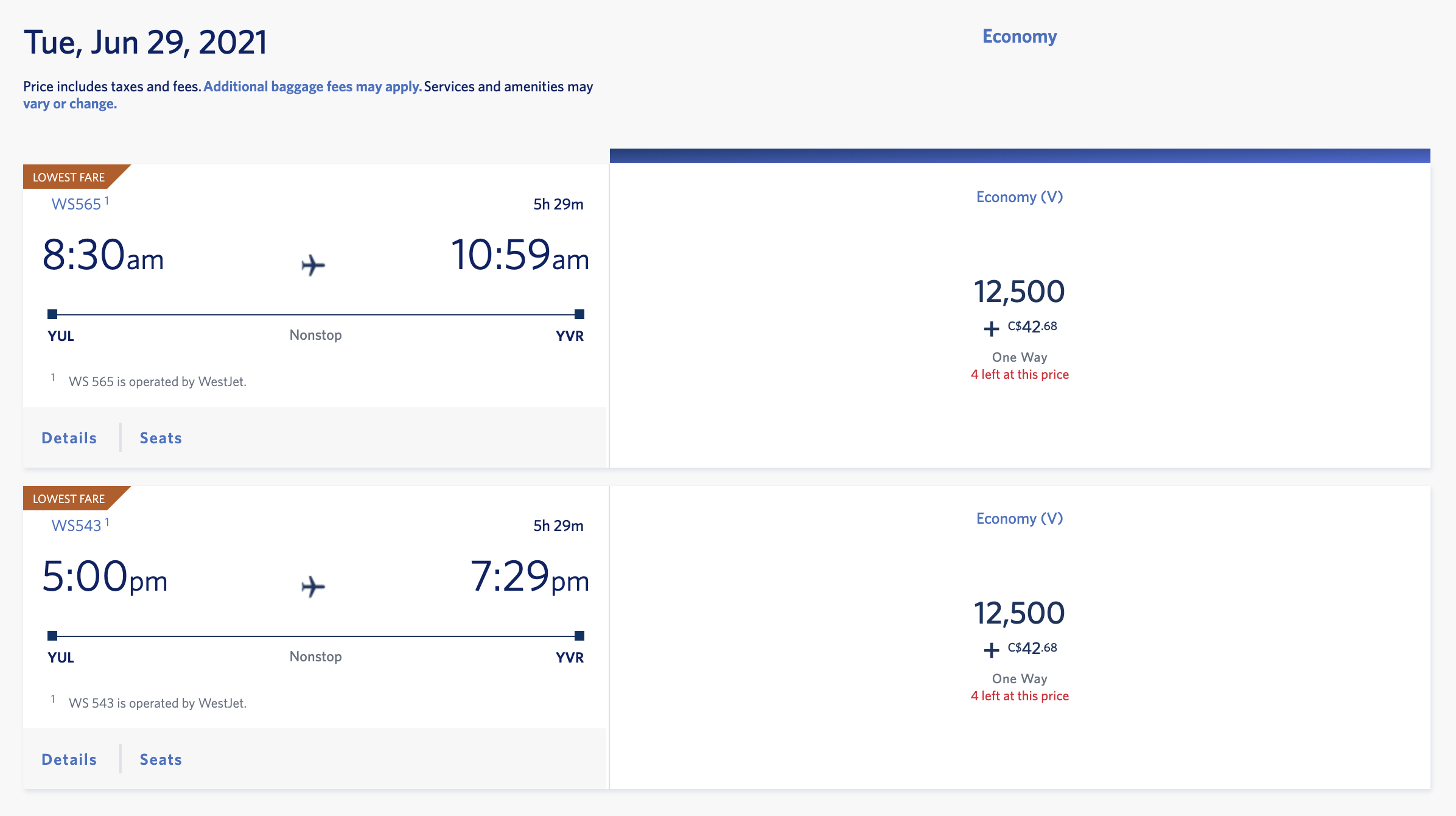
When there’s a connection required along the way, sometimes it’s able to pull up search results; other times, it doesn’t seem to find anything, so you might need to call Delta to make a booking if you’ve found award space independently on two WestJet flights that you’d like to string together.
The good news is that even adding a connection doesn’t affect the pricing of 12,500 SkyMiles one-way.
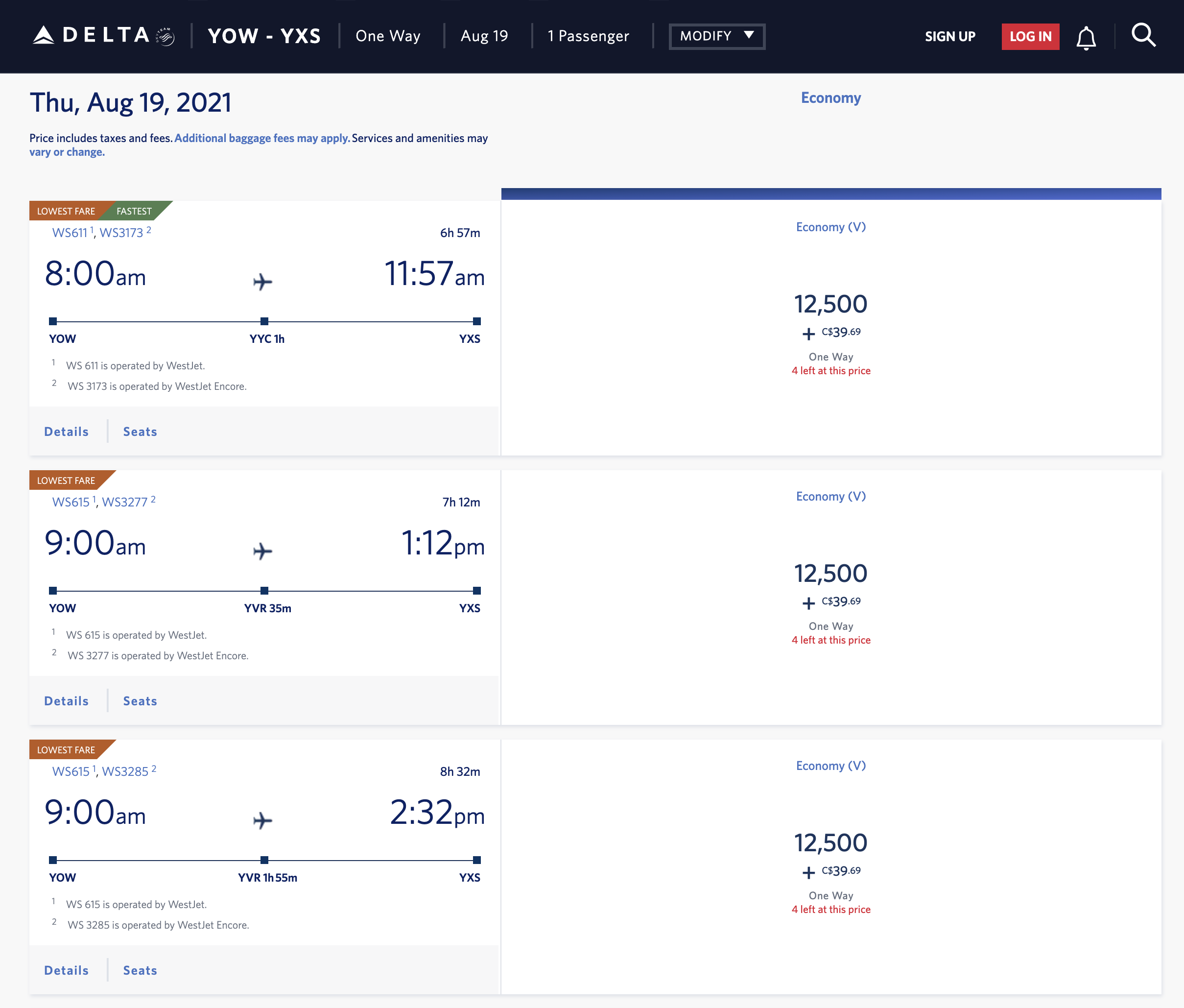
In the past, WestJet Dollars were very much the key to booking domestic flights for essentially a flat fee. Now, it’s instead SkyMiles that may be used to accomplish the same objective, and thankfully there are quite a few accessible ways to earn Delta SkyMiles here in Canada.
The easiest way is to transfer Amex MR points to Delta SkyMiles at a ratio of 1:0.75. If we do the math, we see that 16,700 MR points would be required to convert into 12,500 SkyMiles, so that’s essentially the price point you’re looking at for a one-way domestic flight.
Considering that Aeroplan now charges 12,500–17,500 Aeroplan points as the published range of Air Canada flights in the distance band of 1,501–2,750 miles, we can think of 16,700 Amex MR points as a way to “cap” that amount: if Aeroplan is charging around 12,500 points for, say, Toronto–Vancouver in economy class, then go ahead and book Air Canada, but if Aeroplan wants 20,000 points, then perhaps a WestJet redemption via Delta SkyMiles might make more sense instead.
Outside of transferring Amex MR points, the other major way to rack up Delta SkyMiles is by getting into US credit cards, where American Express US issues a quartet of Delta co-branded credit cards:
- American Express Delta SkyMiles Blue Card: 10,000 SkyMiles upon spending US$500 in the first three months, US$0 annual fee
- American Express Delta SkyMiles Gold Card: 35,000 SkyMiles upon spending US$1,000 in the first three months, US$99 annual fee
- American Express Delta SkyMiles Platinum Card: 40,000 SkyMiles upon spending US$2,000 in the first three months, US$250 annual fee
- American Express Delta SkyMiles Reserve Card: 40,000 SkyMiles upon spending US$3,000 in the first three months, US$550 annual fee
These Delta cards don’t get much attention compared to the MR, Bonvoy, and Hilton cards issued by American Express US, but they certainly have their place for the purpose of earning Delta SkyMiles.
That’s especially the case if you tend to prefer domestic travel over international travel and would like to take advantage of the fixed pricing of 12,500 SkyMiles one-way on WestJet flights.
Furthermore, American Express US MR points can also be transferred to Delta SkyMiles at a 1:1 ratio. If you don’t have much interest in some of the more aspirational uses for US MR points and would prefer to use them for domestic Canadian trips, then redeeming them for WestJet flights at 12,500 SkyMiles a pop can be a good move.
Redeeming Etihad Guest Miles on Air Canada
It’s also worth asking the question of whether a similar workaround can be accomplished for Air Canada flights. Let’s begin with Etihad Guest, which launched its partnership with Air Canada back in June of this year.
Etihad Guest is another 1:0.75 transfer partner from American Express, as well as a 1:1 transfer partner from American Express US and Citi ThankYou Points.
Etihad Guest maintains separate award charts for most of its partner airlines, and the award chart for Air Canada flights is as below:
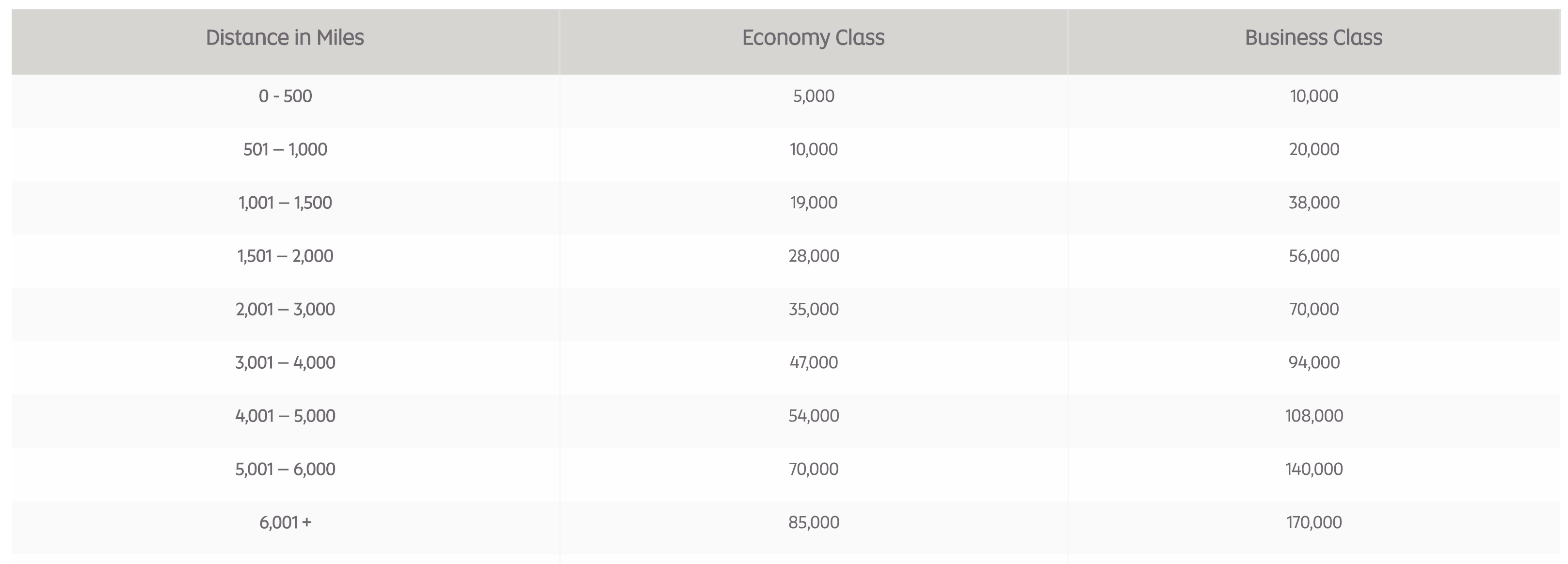
Let’s compare Etihad’s award chart with the Aeroplan Flight Reward Chart’s published ranges for Air Canada flights, also taking into account the number of Amex MR points given the 1:0.75 transfer ratio:
Distance | Etihad Guest miles | Amex MR points to convert into Etihad Guest miles | Aeroplan points |
0–500 miles | 5,000 | 6,700 | 6,000–10,000 |
501–1,000 miles | 10,000 | 13,400 | 10,000–15,000 |
1,001–1,500 miles | 19,000 | 25,400 | 10,000–15,000 |
1,501+ miles | 28,000+ | 37,400+ | 12,500–17,500+ |
(After 1,501+ miles flown, Etihad’s award costs continue to skyrocket while Aeroplan’s remain reasonable, so the comparison isn’t very meaningful anymore.)
As you can see, if you’re starting with a balance of Amex MR points, then in some circumstances it’ll actually be cheaper to transfer them to Etihad Guest instead of transferring them to Aeroplan to book Air Canada flights.
For example, a business class flight in the range of 0–500 miles costs 10,000 Etihad Guest miles, which is equivalent to 13,400 Amex MR points. Meanwhile, Aeroplan’s published range for this flight is strictly higher at 15,000–25,000 Aeroplan points.
On paper, some of the other lower-distance redemptions might also be comparable between the two programs, especially if Aeroplan’s price is moving towards the middle of the range, rather than the low end.
However, despite all of these encouraging signs, ultimately I wouldn’t really recommend booking Air Canada flights with Etihad Guest miles as a general strategy for the following reasons:
- Based on my research, Aeroplan’s dynamic pricing model seems to map pretty well onto whether or not there is partner availability on a given flight. So if Aeroplan is charging in the middle of the range, chances are that flight wouldn’t be bookable via Etihad Guest or any other Star Alliance partner either; meanwhile, if a flight is bookable via Etihad Guest, then chances are it’s at the lower end of Aeroplan’s published range as well, so the savings might not be very significant.
- Air Canada awards via Etihad Guest cannot be booked online and must be booked over the phone, and over several attempts at calling the Etihad Guest call centre, most agents weren’t able to successfully locate award space.
Despite there appearing to be pockets of value in using Etihad Guest to book Air Canada flights on paper, ultimately it doesn’t look like a very promising opportunity. I think you’d be better off leveraging Aeroplan’s preferred pricing for Elite Status members and credit card holders to unlock cheaper award rates on Air Canada instead.
Redeeming Cathay Pacific Asia Miles on Air Canada
Another easily accessible foreign airline program that partners with Air Canada is Cathay Pacific Asia Miles, which you can earn by transferring from points from Amex MR, RBC Avion, or HSBC Rewards, as well as by signing up for the RBC Cathay Pacific Visa Platinum.
Let’s take a gander here to see if there’s any value in this redemption pathway.
The first thing to note is that Asia Miles can only be redeemed on a limited set of Air Canada domestic flights, as follows:

While Asia Miles doesn’t publish a dedicated partner award chart, it does offer a very robust mileage calculator for determining the price of any given award. Inputting Toronto–Vancouver, for example, and we get the following pricing:

For comparison, the published ranges with Aeroplan are 12,500–17,500 Aeroplan points in economy class and 25,000–60,000 Aeroplan points in business class.
You might be thinking: if the dynamic pricing model happens to fall near the top end of the ranges, then isn’t an Asia Miles redemption looking like a decent deal?
The challenge, however, is the same as what we had outlined above with Etihad Guest: Aeroplan’s dynamic pricing model maps pretty closely onto its partner availability, so if the pricing falls near the top end of the ranges, then it’s unlikely the flight will be bookable with Asia Miles in the first place.
You might occasionally find an exception to this rule, in which case booking with Asia Miles would be a good idea.
Still, it won’t be the easiest booking to make: not only are Air Canada flights not bookable online, but even the call centre agent wasn’t able to help me search for availability and price things out.
Instead, she insisted that I must submit a request through Asia Miles’s Flight Award Request Form and wait for a representative to email me back in order to proceed with the booking.

Alternatively, some reports indicate that it’s possible to search and book on Air Canada through the Asia Miles live chat service, which may well be your best bet.
Conclusion
Award devaluations are never pretty, and the recent change to WestJet’s Member Exclusive fares were no exception. But when a devaluation hits, it’s important to look for workarounds and come up with a new strategy to optimize, and Delta SkyMiles’s fixed one-way pricing of 12,500 SkyMiles (equivalent to 16,700 Amex MR points) on WestJet flights definitely fits that bill.
Meanwhile, by and large, the best way to book Air Canada flights is still to redeem Aeroplan points. Yes, some foreign partner programs have access to Air Canada award space in theory, but the logistical challenges associated with booking these awards makes it tough to justify the added effort when compared against the meagre cash savings.
Taken together, a new prevailing strategy for domestic transcontinental flights may well be to look up Aeroplan’s prices as your first choice, and if it far exceeds 16,700 Amex MR points due to the mercurial beast that is Aeroplan’s dynamic pricing model, then consider moving points to Delta and redeeming SkyMiles on WestJet instead.
In this article, we’ve focused on the points currencies that we can earn relatively easily here in Canada. If you’re open to applying for US credit cards, transferring Marriott Bonvoy points, or purchasing points directly, then other Star Alliance programs like Turkish Miles & Smiles, Avianca LifeMiles, and United MileagePlus are worth a look too – indeed, we may well cover those opportunities in future installments.










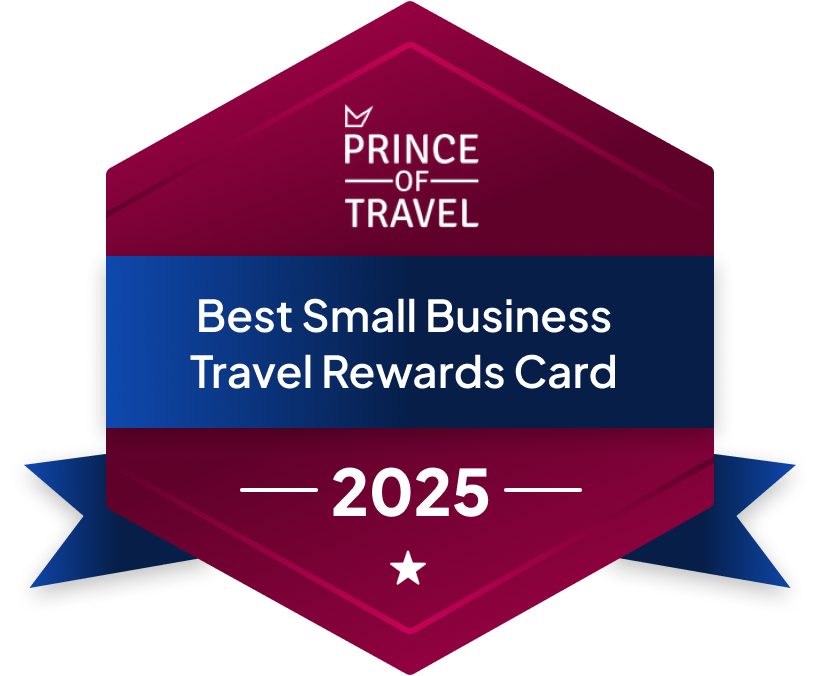


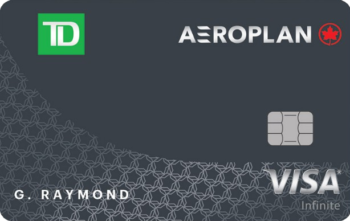


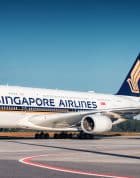
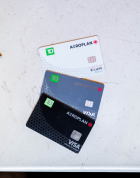
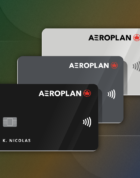

Krisflyer is a good option too if you have HSBC world elite. Best value is in North America and short fly in asia. With booster promo with HSBC with this singapour airlines
Hey Ricky,
Thank you for continuing to research new ways. The devaluation hit us very hard out in the Atlantic.
I doubt any of these will be likely candidates as you say, for the reasons you mention…but also because not many of us are still sitting on a pile of MR they can transfer anymore. I guess there are some folks….
Hopefully you will find some good alternative solutions to add share with us. Still appreciating all of your work.
Let’s look at this they other way around. Can WestJet dollars be used for anything valuable on other airlines ? I must say that I am still pissed by WestJet decision to eliminate the $125 WJD redemption and I just can’t see how one can recommend earning or redeeming WJD anymore. Even worse I can’t see how RBC would want to be associated with WestJet anymore or why anyone in Canada would want to fly with WestJet (even for Calgarians) over Air Canada. Am I overeacting here or other readers feel the same way ? Help shed some light here Ricky ? Should we still do business with WestJet and their WJD when one is rewarded in saving about $8 ou $10 on a flight by being loyal to Westjet ? I don’t think enough has been said about this fiasco. Heads should roll over that decision.
Agreed, I got rid of my RBC WestJet MasterCard several months ago after I had used WestJet dollars to book some flights that got cancelled because of COVID thus the WestJet dollars ended up in my ‘travel bank’ which expire. Why have a credit card that ties you only to WestJet travel rewards and nothing else that I am aware of.
Do you have access to Premium or Business seats on WS when booking with Skypesos?
Doesn’t seem like it. That’s one area in which the new WestJet Member Exclusive fares have an advantage I suppose 😉
Ricky,
Wondering why you omitted using United Miles as a way to redeem for domestic flights?
That’s because the article is meant to focus on points currencies that we can easily earn here in Canada in meaningful quantities. But since others might be wondering too, I’ll add a mention of it in the article.
Since Marriott is the base to be able to convert to various mileage programs I myself use United quite frequently, I suspect others as well. Great article nonetheless!
LifeMiles.
Interesting article! I thought Delta skymiles weren’t valuable but this does give us some sweetspots for us canadians. I am at 4 US AMEX credit cards now so I’m unable to get any credit cards, but next year when I’m able to cancel my card, I’ll definitely have to look into one of the Delta cards
I have two of the US Delta SkyMiles card – gold and platinum. One nice feature of the platinum is 2-4-1 voucher upon card renewal – or so I hope to find out in Feb next year. Does anyone know if I can use this on a westjet flight redemption through sky miles or just delta flights?
Looks like the companion voucher is for Delta, Delta Connection, and Delta Shuttle flights only.